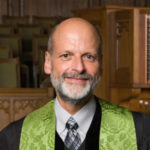 Good morning!
Good morning!
I hope this day finds you and your family well. I invite you to take a few moments with me to read and reflect upon today’s scripture selection — and to carry these thoughts with you into your day.
Today’s Scripture: 1 Corinthians 13
If I speak in the tongues of mortals and of angels, but do not have love, I am a noisy gong or a clanging cymbal. 2 And if I have prophetic powers, and understand all mysteries and all knowledge, and if I have all faith, so as to remove mountains, but do not have love, I am nothing. 3 If I give away all my possessions, and if I hand over my body so that I may boast,[a] but do not have love, I gain nothing.
4 Love is patient; love is kind; love is not envious or boastful or arrogant 5 or rude. It does not insist on its own way; it is not irritable or resentful; 6 it does not rejoice in wrongdoing, but rejoices in the truth. 7 It bears all things, believes all things, hopes all things, endures all things.
8 Love never ends. But as for prophecies, they will come to an end; as for tongues, they will cease; as for knowledge, it will come to an end. 9 For we know only in part, and we prophesy only in part; 10 but when the complete comes, the partial will come to an end. 11 When I was a child, I spoke like a child, I thought like a child, I reasoned like a child; when I became an adult, I put an end to childish ways. 12 For now we see in a mirror, dimly,[b] but then we will see face to face. Now I know only in part; then I will know fully, even as I have been fully known. 13 And now faith, hope, and love abide, these three; and the greatest of these is love.
Tim’s Devotional Reflection for Today
Among the entries in The Guinness Book of World Records is the shortest sermon ever preached. It was given by John Albrecht, an Episcopal priest in Michigan. He stood in his pulpit to preach, paused, and said “Love!” He then sat down. Some of Albrecht’s members said it was the best sermon he ever preached. Could his sermon have been any other word? Would any other word sum it all up like that word?
Without love, Paul says in 1 Corinthians 13, the greatest gift, the most outstanding ability, or the strongest faith amounts to nothing. It is love that stands at the very center of the message of Jesus.
Paul’s message is so important because of the many and varied ways the word “love” is used in our society. No doubt it was true for Corinth, as well. As Paul emphasizes the centrality of love in all that we are and all that we do, Paul describes what love is and what love isn’t, what it does and what it does not do.
The Greek word agape (love) seems to have been virtually a Christian invention — a new word for a new thing. The word was not nearly as common in literature at large or in the Greek version of the Hebrew scriptures as it is in the New Testament. In the relatively brief New Testament, there are more than 150 occurrences of the word. The word refers not so much to a feeling as to a matter of will and action. That’s obviously true, since Jesus commands us to love even those we don’t like. Agape is the basic element of Christlikeness. Love is choosing to do right and to act in a loving manner no matter how you feel.
Just as God’s love is unconditional, so our love is to be without condition.
That is not usually the case with us. There are conditions most of the time, many strings are attached, and, in fact, what passes for love can be manipulation to get what we want. I ran across a widely distributed letter that illustrates my point:
Dearest Jimmy,
No words could ever express the great unhappiness I’ve felt since breaking our engagement. Please say you’ll take me back. No one could ever take your place in my heart, so please forgive me. I love you, I love you, I love you! Yours forever, Marie.
- S. Congratulations on willing the state lottery.
You have to wonder about the sincerity of her love letter.
Listen again to Paul’s words: “Love is patient; love is kind; love is not envious or boastful or arrogant or rude. It does not insist on its own way; it is not irritable or resentful; it does not rejoice in wrongdoing but rejoices in the truth. It bears all things, believes all things, hopes all things, endures all things. Love never ends.”
Marilou Bonham Thompson has a little poem that reminds us that love is much more than just a word. Listen to her words that remind us that love is active, and love never ends:
It takes more than saying
to make love so.
It takes being and doing,
as stitch by stitch,
Love makes a pattern that endures.”
(Marilou Bonham Thompson, “Patchwork,” Abiding Appalachia: Where Mountain and Atom Meet (Memphis, Tenn.: St. Luke’s Press, 1978), 31)
Love is not just a sentimental, sweet idea or abstraction. Love is concrete and real, and love most certainly is a verb. This is expressed time and again in the teachings and life of Jesus, in the writings of Paul, and throughout the pages of scripture—both the Hebrew scriptures and the New Testament.
As Rabbi Lionel Blue talks of how he learned about love, he tells of his grandmother taking him on weekly “expeditions”:
On Thursday nights she woke me up and at dead of night, when the gas-lamps were turned down to a flicker, we went round the block, putting little packets through letter-boxes.
They were little parcels of money and food to help poorer families celebrate the coming Sabbath. They were given at night so that giver and receiver would never meet, and neither would feel obligation or shame. Occasionally we met other [grandmothers], wrapped in shawls and shadows, waddling from house to house.
I was surprised when I first saw a picture of angels after I became an evacuee. Who could believe in their too-sweet smiles, the peroxide blonde hair and the fairy wings? My angels were solid from the neck down. They were Semitic, rheumatic and waistless. (Daytrips to Eternity (London: Darton, Longman and Todd, 1987), p. 48)
Hymn Suggestion
“The Gift of Love”
Though I may speak with bravest fire,
And have the gift to all inspire,
And have not love, my words are vain,
As sounding brass, and hopeless gain.
Though I may give all I possess,
And striving so my love profess,
But not be given by love within,
The profit soon turns strangely thin.
Come, Spirit, come, our hearts control,
Our spirits long to be made whole.
Let inward love guide every deed;
By this we worship, and are freed.
Thank you for sharing this moment of your day with me, with God, and with these reflections on a portion of scripture. I hope you will carry these with you throughout your day and night.
Grace and Peace,
![]()
Dr. Tim Bruster
Senior Pastor

